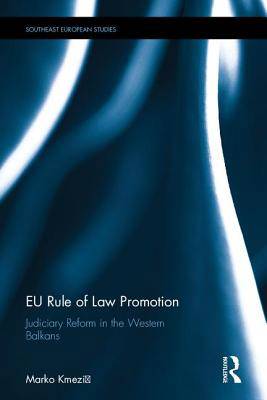
- Afhalen na 1 uur in een winkel met voorraad
- Gratis thuislevering in België
- Ruim aanbod met 7 miljoen producten
- Afhalen na 1 uur in een winkel met voorraad
- Gratis thuislevering in België
- Ruim aanbod met 7 miljoen producten
Omschrijving
Do EU institutions have an influence on the implementation of the rule of law in potential candidate countries and, if so, of what kind? During the compliance monitoring process related to the effective rule of law and democracy the EU Commission tests and criticizes the effectiveness of the judiciary and strengthens the rule of law in preparation for accession. In the Western Balkans this was a process fraught with difficulties.
Despite the fact that academic scholarship and democratic politics agree on rule of law as a legitimizing principle for the exercise of state authority, there is no uniform European standard for institution-building or monitoring activities by the EU in this area. With focus on the reform of the judiciary in five case study countries of Bosnia and Herzegovina, Kosovo, Macedonia, Montenegro, and Serbia, this empirical research investigates the EU's transformative power with regard to the effectiveness of rule of law and judicial sector reform in its infancy. It analyses the depth and limitations of EU rule of law promotion in the Western Balkans and presents policy recommendations intended to address the shortcomings in judiciary reform.
This book aims to fill the gap in the existing academic scholarship of EU politics, law and Western Balkans literature.
Specificaties
Betrokkenen
- Auteur(s):
- Uitgeverij:
Inhoud
- Aantal bladzijden:
- 200
- Taal:
- Engels
- Reeks:
Eigenschappen
- Productcode (EAN):
- 9781472485557
- Verschijningsdatum:
- 19/10/2016
- Uitvoering:
- Hardcover
- Formaat:
- Genaaid
- Afmetingen:
- 156 mm x 233 mm
- Gewicht:
- 529 g

Alleen bij Standaard Boekhandel
Beoordelingen
We publiceren alleen reviews die voldoen aan de voorwaarden voor reviews. Bekijk onze voorwaarden voor reviews.












